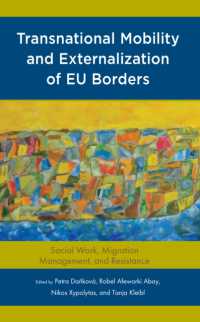- ホーム
- > 洋書
- > 英文書
- > Cinema / Film
Full Description
In the context of a frantic world that celebrates instantaneity and speed, a number of cinemas steeped in contemplation, silence and duration have garnered significant critical attention in recent years, thus resonating with a larger sociocultural movement whose aim is to rescue extended temporal structures from the accelerated tempo of late-capitalism. Although not part of a structured film movement, directors such as Carlos Reygadas, Tsai Ming-liang, Béla Tarr, Pedro Costa and Kelly Reichardt have been largely subsumed under the term 'slow cinema'. But what exactly is slow cinema? Is it a strictly recent phenomenon or an overarching cinematic tradition? And how exactly do slow cinemas interrelate on an aesthetic, technical and political level?
Deploying the concept of slowness as an umbrella category under which filmmakers and traditions from different historical and geographical backgrounds can fruitfully converge, this innovative collection of essays interrogates and expands the frameworks that have generally informed slow cinema debates. Repositioning the term in a broader theoretical space, the book combines an array of fine-grained studies that will provide valuable insight into the notion of slowness in the cinema, while mapping out past and contemporary slow films across the globe.
Contents
Table Of Contents; Illustrations; Foreword, Julian Stringer; Introduction: From Slow Cinema to Slow Cinemas, Tiago De Luca & Nuno Barradas Jorge; Part I: Historicising Slow Cinema; 1: The Politics of Slowness and the Traps of Modernity, Lúcia Nagib; 2: The Slow Pulse of the Era: Carl Th. Dreyer's Film Style, C. Claire Thomson; 3: The First Durational Cinema and the Real of Time, Michael Walsh; 4: 'The Attitude of Smoking and Observing': Slow Film and Politics in the Cinema Of Jean-Marie Straub and Danièle Huillet, Martin Brady; Part II: Contextualising Slow Cinema; 5: Temporal Aesthetics of Drifting: Tsai Ming-Liang and a Cinema of Slowness, Song Hwee Lim; 6: Stills and Stillness in Apichatpong Weerasethakul's Cinema, Glyn Davis; 7: Melancholia: The Long, Slow Cinema of Lav Diaz, William Brown; 8: Exhausted Drift: Austerity, Dispossession and the Politics of Slow in Kelly Reichardt's Meek's Cutoff, Elena Gorfinkel; 9: If These Walls Could Speak: From Slowness to Stillness in the Cinema of Jia Zhangke, Cecília Mello; Part III: Slow Cinema And Labour; 10: Wastrels of Time: Slow Cinema's Labouring Body, The Political Spectator, and the Queer, Karl Schoonover; 11: Living Daily, Working Slowly: Pedro Costa's in Vanda's Room, Nuno Barradas Jorge; 12: Working/Slow: Cinematic Style as Labour in Wang Bing's Tie Xi Qu: West Of The Tracks, Patrick Brian Smith; 13: 'Slow Sounds': Duration, Audition and Labour in Liu Jiayin's Oxhide and Oxhide II, Philippa Lovatt; Part IV: Slow Cinema and the Nonhuman; 14: It's About Time: Slow Aesthetics in Experimental Ecocinema and Nature Cam Videos, Stephanie Lam; 15: Natural Views: Animals, Contingency and Death in Carlos Reygadas's Japón and Lisandro Alonso's Los Muertos, Tiago de Luca; 16: The Sleeping Spectator: Nonhuman Aesthetics in Abbas Kiarostami's Five: Dedicated to Ozu, Justin Remes; Part V: The Ethics and Politics of Slowness; 17: Béla Tarr: The Poetics and the Politics of Fiction, Jacques Rancière; 18: Ethics of the Landscape Shot: A.K.A Serial Killer and James Benning's Portraits of Criminals, Julian Ross; 19: Slow Cinema and the Ethics of Duration, Asbjørn Grønstad; Part VI: Beyond 'Slow Cinema'; 20: Performing Evolution: Immersion, Unfolding and Lucile Hadžihalilović's Innocence, Matilda Mroz; 21: The Slow Road to Europe: The Politics and Aesthetics of Stalled Mobility in Hermakono and Morgen, Michael Gott; 22: Crystallising the Past: Slow Heritage Cinema, Rob Stone and Paul Cooke







